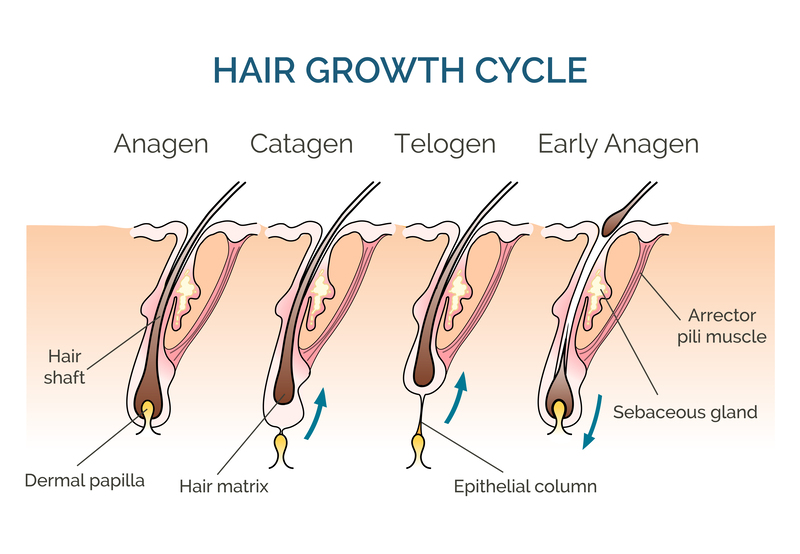Hair loss is a common concern for many individuals, impacting both men and women alike. While there can be various reasons behind this issue, one factor that often goes unnoticed is the role of Vitamin D. In this comprehensive guide. We will delve into the intricate relationship between Vitamin D and hair loss, exploring how this essential nutrient can play a pivotal role in maintaining healthy and vibrant locks.
Understanding the Link: Vitamin D and Hair Fall
Vitamin D’s importance spans many physiological processes, including its lesser-known role in maintaining healthy hair. In this section, we’ll explore how this vital nutrient impacts hair health and the potential consequences of its deficiency.
The Basics of Vitamin D
Vitamin D, often called the “sunshine vitamin,” is crucial for overall health. It aids in calcium absorption, supporting bone health and immune function. Moreover, vitamin D is crucial in the hair growth cycle, specifically in activating hair follicles. When there is a deficiency in vitamin D, the hair follicles can become dormant, leading to hair fall and thinning. Low vitamin D levels have also been associated with conditions like alopecia areata, a form of autoimmune hair loss. Therefore, maintaining optimal vitamin D levels is essential for maintaining healthy and vibrant hair.
Hair Fall and Vitamin D Deficiency
Research suggests a direct correlation between Vitamin D deficiency and hair fall. One of the symptoms of a vitamin D deficiency may be hair loss or fall. The body’s lack of vitamin D can affect the hair follicles and disrupt the hair growth cycle. This can lead to excessive hair shedding and thinning of the hair strands. In severe cases, vitamin D deficiency can even cause temporary baldness. Therefore, ensuring adequate vitamin D intake through sunlight exposure or supplementation is crucial in maintaining healthy hair.
How Does Vitamin D Impact Hair Growth?
Stimulating hair follicles and encouraging the growth of new hair are important functions of vitamin D. It is necessary for the hair cycle, making sure that follicles successfully pass through the growth phase. In order to maintain the healthy operation of the hair follicles, vitamin D helps control the expression of genes involved in hair growth. Furthermore, vitamin D facilitates the absorption of calcium, which is essential for healthy hair. The hair follicles may go dormant or produce fewer, weaker hair strands if they don’t get enough vitamin D. Thus, having enough vitamin D is necessary to keep hair strong and healthy.

Unveiling the Complexities: Vitamin D and Hair Loss
As we delve into the intricate relationship between vitamins and hair health, we begin to unravel how essential nutrients affect our hair. This section particularly focuses on the dual impact of Vitamin D and B12 on hair growth and hair loss.
Can Low Vitamin D and B12 Cause Hair Loss?
Hair loss may result from low vitamin D and B12 levels. Since vitamin D aids in both hair growth and maintenance, it is essential for the health of hair follicles. In a similar vein, red blood cell formation—which supplies nutrients and oxygen to hair follicles—requires B12. A deficiency in either vitamin D or B12 can worsen hair loss. As a result, treating these deficiencies may improve overall hair health and hair growth.
Excess Vitamin D and Hair Loss: Debunking Myths
Contrary to popular belief, excess vitamin D does not cause hair loss. In fact, it is important to maintain adequate vitamin D levels to promote healthy hair growth. While deficiencies in vitamin D can lead to hair loss, excessive amounts of the vitamin do not have the same effect. It is essential to strike a balance and ensure that the body receives the right amount of vitamin D for optimal hair health.
Addressing hair loss can be multifaceted, and ensuring adequate vitamin D is a critical element in this complex puzzle. Here, we’ll explore practical strategies for increasing vitamin D levels to promote hair retention and growth.
Dietary Sources of Vitamin D
Including foods high in vitamin D in your diet is a proactive way to fight hair loss. Add fatty fish like mackerel and salmon, egg yolks, sun-exposed mushrooms, and fortified dairy and plant-based milk substitutes. Regular consumption of these foods can support healthy vitamin D levels in the body, which in turn supports hair growth. Furthermore, exposure to sunlight and outdoor activities can naturally raise vitamin D levels.
Supplements for Hair Health
In cases where dietary adjustments fall short, supplements can bridge the gap. Consulting with a healthcare professional to determine the appropriate dosage is crucial to avoid potential side effects. For example, a person who is experiencing hair loss may incorporate more salmon and mackerel into their diet, along with fortified dairy and plant-based milk alternatives, to increase their intake of vitamin D. They may also make sure to include egg yolks and mushrooms in their meals. Additionally, they may spend more time outdoors, getting sunlight exposure to naturally boost their vitamin D levels.

Lifestyle Changes for Optimal Hair Care
Beyond diet and supplements, lifestyle adjustments can contribute significantly. Stress management, regular exercise, and adequate sleep play integral roles in maintaining overall health, including the health of your hair. For example, someone looking to improve their hair health could incorporate a recipe into their meals that includes egg yolks and sautéed mushrooms, which are both sources of vitamin D. They can also make an effort to spend more time outdoors, perhaps by taking walks or exercising in the sunlight to increase their vitamin D levels naturally. If these dietary adjustments and sun exposure are not enough to achieve optimal hair care, they can seek guidance from a healthcare professional who can suggest further lifestyle changes, such as stress management
Consult a Professional Dermatologist
These initial efforts, while vital, may be complemented by guidance from a dermatologist who can pinpoint the specific needs unique to your situation. Today, online dermatology platforms have made it incredibly accessible to consult with a professional without leaving your home. These services can provide comprehensive care, including personalized analysis and treatment options, potentially issuing an online hair loss prescription after evaluation.
Final Thoughts
In conclusion, understanding the relationship between Vitamin D and hair loss provides a valuable tool in the quest for luscious locks. From acknowledging the impact of deficiencies to embracing a holistic approach, incorporating Vitamin D into your routine can be a game-changer. Maintaining optimal hair health is a multifaceted journey, and Vitamin D is a vital player in this narrative. Say goodbye to hair loss woes by nurturing your body with the sunshine vitamin it deserves!
FAQs
Are Vitamin D and hair loss associated differently in men and women?
Yes, while Vitamin D deficiency can affect hair loss in both men and women, the patterns of hair loss and responses to treatment can differ due to hormonal differences.
Can overuse of hair-styling products interfere with the role of Vitamin D in hair health?
Overuse of hair-styling products can potentially damage hair follicles and impair hair health but is not directly related to Vitamin D’s role in the hair growth cycle.
Does the change of seasons affect Vitamin D levels and hair loss?
The change of seasons can influence Vitamin D levels, especially in winter when sunlight exposure is limited, which can indirectly exacerbate hair loss. Supplementing with Vitamin D during these months may be beneficial.
Are there specific medical tests to determine if hair loss is related to Vitamin D deficiency?
A blood test can measure serum 25-hydroxyvitamin D levels to determine Vitamin D deficiency. If hair loss persists, doctors may recommend this test, among others, to establish a cause.
